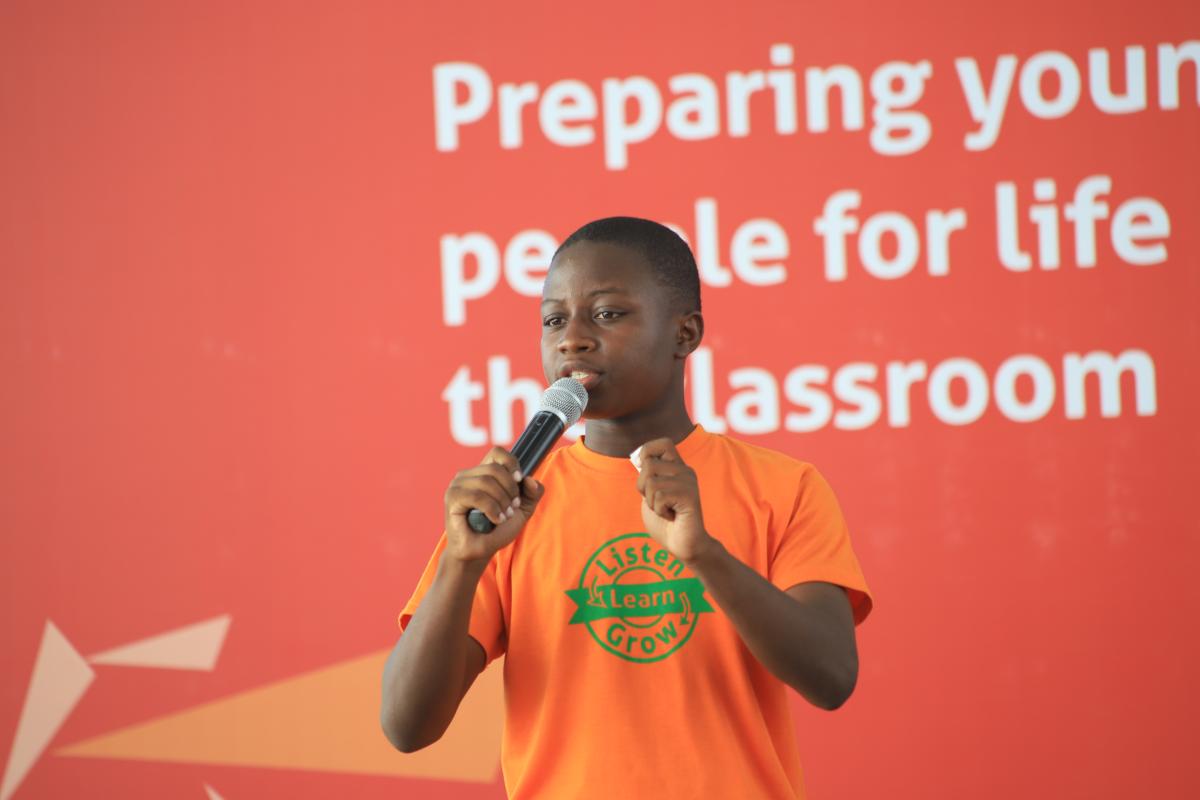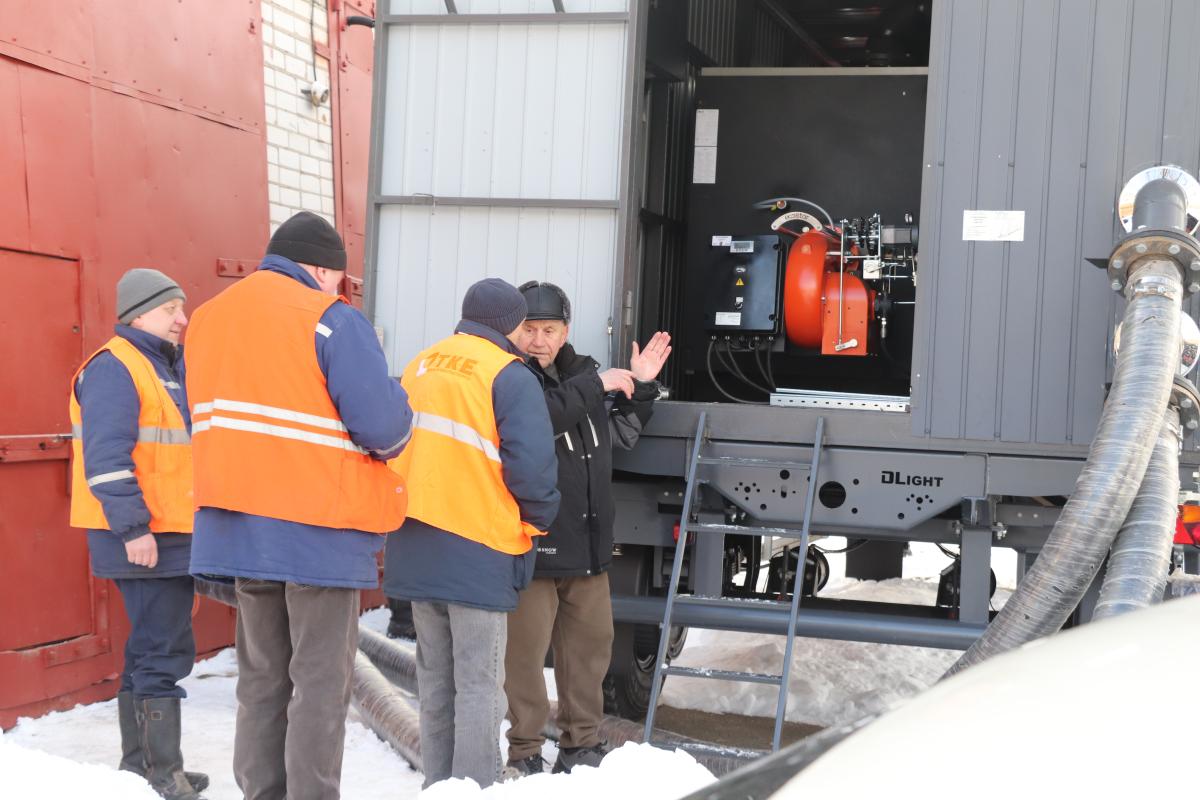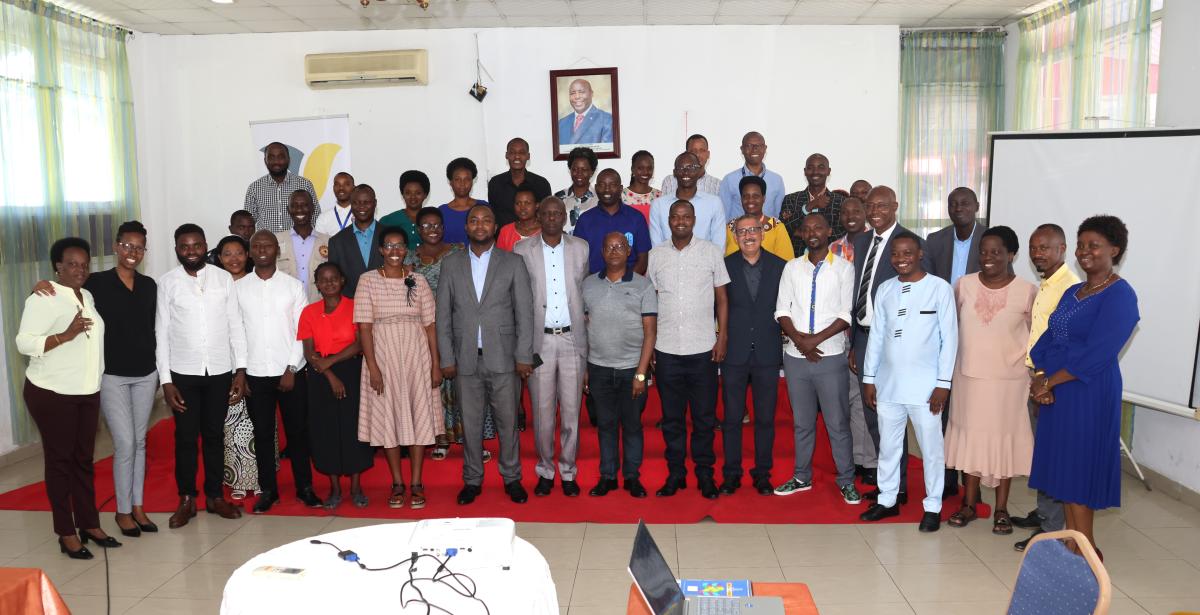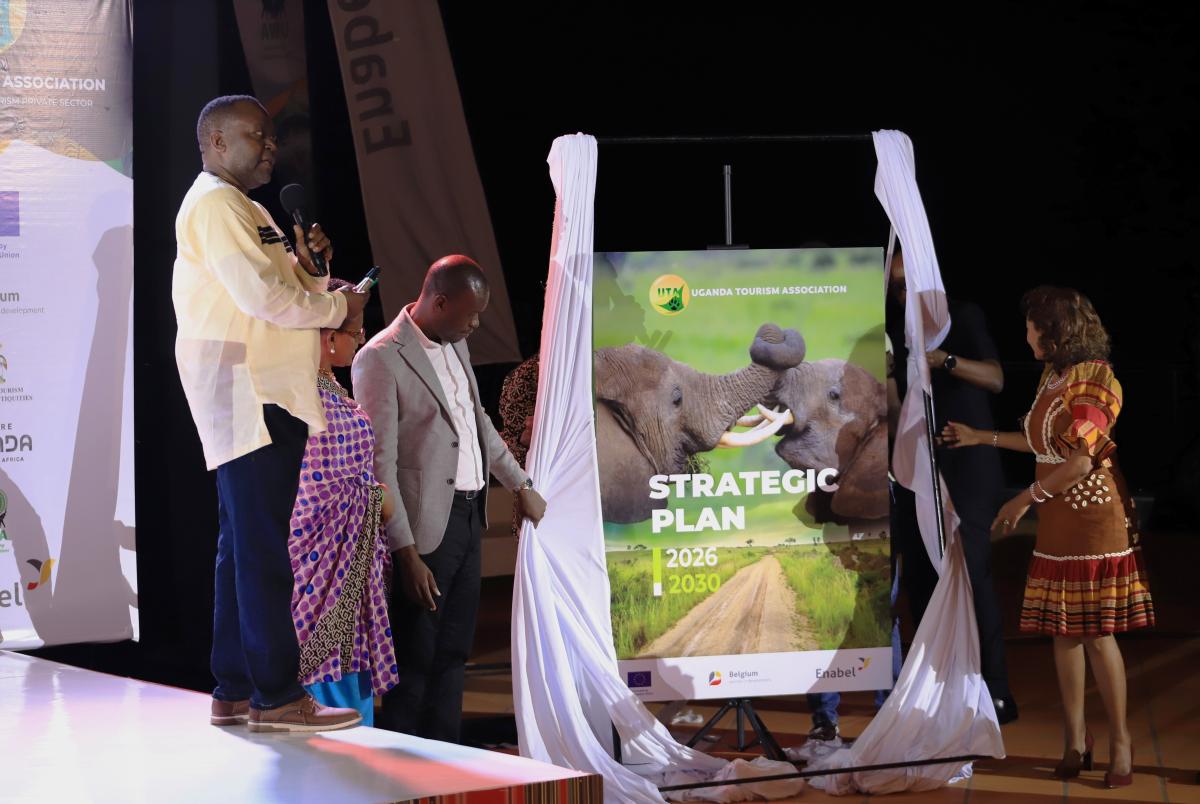Search
Viewing 1 to 15 of 3123 news
-
10,000 learners in Uganda equipped with life skills
Sharon IBENU | 27/02/2026
For many years, education systems have largely measured success through grades, exams, and pass rates. While academic results matter, this strong focus can leave little room for teaching the practical life skills young people need to handle real pressures such as stress, peer influence, conflict among others. Without these skills, some learners struggle to cope, lose motivation, miss school, perform poorly, and in some cases drop out before completing their studies. To address this gap, Enabel, in partnership with the Ministry of Education and Sports (MoES) and the Private Education Development Network (PEDN), successfully implemented the first phase of a major life skills education initiative. Launched in In June 2024, the initiative aimed at integrating life skills into the school environment using the life skills toolkit of the Ministry of Education and Sports. Through this approach, 10,000 learners across 43 schools in the Rwenzori and Busoga regions were empowered to develop the competencies needed to navigate adolescence and contribute positively to their communities. The completion of this first phase was marked the Life Skills Convention held on February 14th2025, at the National ICT Innovation Hub Nakawa-Kampala. The event brought together education stakeholders to reflect on progress, share lessons, and reaffirm their commitment to strengthening adolescent well-being and school completion.Speaking at the convention Nicolas Oebel, the Country Director of Enabel in Uganda, commended stakeholders noting that life skills are as vital as academics because they build the resilience young people need to thrive. "By completing this first phase, we are not just celebrating numbers, but the 10,000 learners who now possess the skills to make informed decisions, stay in school, and shape their own destinies. This achievement is a testament to the collective power of our 250 facilitators, 43 headteachers, and dedicated district leaders who are transforming the educational landscape of Uganda." Oebel explained that the programme supports education reforms aimed at giving learners quality opportunities that prepare them for school, work, and life. He noted that the life skills programme empowers learners with 10 key competencies, including communication and self-expression, leadership and influence, problem-solving and conflict management, creativity and innovation, among others. He added that these competencies help learners become agile and adaptive citizens able to face personal, academic, economic, social, and environmental challenges. He added that the first phase provided valuable lessons, and the next target is to reach 20,000 new learners with life skills education this year an expansion that will require even stronger commitment from all stakeholders. Michel Dewez, the Belgium head of Cooperation emphasised the need for continued teamwork and the key role teachers play in developing learners beyond academics. “Life skills education allows us to contribute to the holistic development of young people, and teachers play a central role in nurturing these skills preparing learners to navigate the personal, social and academic challenges they will face,” he said. Enabel remains committed to working closely with the Ministries of Education and Health to ensure that young people are equipped to stay in school and thrive.
-
Ukraine: Enabel donates 28 Belgium-funded mobile boilers to Chernihiv region
Taisiia DRUZIUK | 25/02/2026
Enabel has strengthened its winterisation efforts in the Chernihiv region by donating 28 mobile boiler units to support social infrastructure. 20 units were procured and delivered in response to an urgent request of Ukraine’s Ministry of Development of Communities and Territories to support the region following the escalation of Russian attacks on critical infrastructure. "At the start of winter, support from the Belgian agency for international cooperation made a real difference. This equipment helped us launch the heating season on time, despite the critical situation caused by Russian strikes." – explained Governor Viacheslav Chaus. Belgium's Ambassador to Ukraine Luc Jacobs, Deputy Minister for Development Kostiantyn Kovalchuk, Head of the Chernihiv Regional Military Administration Viacheslav Chaus, and Enabel Country Director Dirk Deprez got a firsthand look at one of the boiler units on-site. "For the Chernihiv region, backup heating is a matter of public safety. These boilers will enable communities to respond quickly in emergencies and ensure heating for hospitals, other social infrastructure facilities, and residential buildings. We are grateful to the Belgian government and Enabel for their sustained support." – shared Deputy Minister Kostiantyn Kovalchuk. The mobile boilers are part of Belgium's broader energy support package for the Chernihiv region. Two healthcare facilities in the region have already received solid-fuel modular boilers, while work on the thermal modernisation of a Kyinka lyceum is drawing to a close.
-

Challenge Innov4Health : des solutions innovantes conçues par et pour les communautés
Reece-hermine ADANWENON | 24/02/2026
Entre Octobre et Décembre2025, les communautés des zones d’intervention du Programme d’Appui à la santé Sexuelle et Reproductive et à l’Information Sanitaire (P@SRIS II) ont été pleinement mobilisées pour stimuler la créativité locale à coût maîtrisé et accélérer des résultats en matière de santé. Initié par le Ministère de la Santé avec l’appui d’Enabel à travers le P@SRISII, l’édition 2025 du Challenge Innov4Health a transformé un besoin en opportunité: un défi lancé, des solutions concrètes et immédiatement applicable ont émergé du terrain. Et si les réponses les plus pertinentes et les plus adaptées aux défis de santé sexuelle et reproductive venaient, avant tout, des communautés elles-mêmes ?Dans un contexte marqué par des contraintes budgétaires croissantes et des défis persistants en matière de santé sexuelle et reproductive (SSR), Enabel Bénin en Partenariat avec le Ministère de la Santé, a fait un choix stratégique : innover pour accroître l’impact.C’est dans cette dynamique qu’a été lancé le Challenge Inno4Health 2025. À l’issue d’un atelier bilan du programme, les besoins prioritaires ont été identifiés puis transformés en opportunité d’innovation ouverte. Sur plus de 100 dossiers reçus, huit projets ont été sélectionnés et accompagnés dans une phase pilote.Les résultats sont tangibles et dépassent les attentes:- plus de 1000 personnes sensibilisées directement dans les communes de Parakou, N’Dali, Aplahoué, Lokossa, Kpomassè et Zè.- 60 pères champions formés et engagés pour la promotion des droits sexuels et reproductifs et la lutte contre les violences basées sur le genre.- 20 ambassadrices communautaires et 15 pairs leaders inclusifs formées et mobilisées.- 50 jeunes mères ont été accompagnées pour une meilleure prise en charge de leur santé post natale.- des infrastructures durables installées et des outils numériques accessibles à tous developpés.8 projets, une même ambition : accélérer le changementDes fresques murales à Parakou aux clubs d'adolescents à Aplahoué, des Pères Champions à N'Dali aux soins post-nataux à Zè, chaque projet a apporté une réponse innovante, ancrée dans sa réalité locale, à des défis partagés: l'accès à l'information en santé sexuelle et reproductive, la prévention des violences basées sur le genre et l'autonomisation des jeunes.Les projets lauréats ont exploré des dimensions complémentaires de la SSR notamment:- les approches artistiques et culturelles pour sensibiliser les jeunes,- les clubs de jeunes et entrepeneuriat communautaire pour renforcer l’autonomisation - la mobilisation des hommes dans la santé maternelle- l'’innovation numérique inclusive avec un chatbot accessible aux jeunes en situation de handicap- l’autonomisation économique come levier de la santé- les soins post-nataux intégrés, associant prise en charge plysique et soutien psychologique.Ensemble, ces innovations démontrent qu’en créant un cadre propice et en stimulant la créativité locale, il est possible d’identifier des solutions concrètes, adaptés et immédiatement appiclables pour accélérer les résultats en matière de santé. Retour sur les huit initiatives qui ont marqué cette première éditionÀ Parakou, l’Association Belle et Forte (ABF) a mobilisé la musique, le slam, les clips vidéo et les fresques murales pour sensibiliser à la santé sexuelle et reproductive et prévenir les violences basées sur le genre. Vingt ambassadrices communautaires ont été formées et des milliers de jeunes ont été touchés via les réseaux sociaux. L’art est devenu un puissant vecteur de santé.À Aplahoué, l’Association Atelier Ouverture Azo, avec son projet EKPLAXOXU, a installé trois clubs Ados/Jeunes dans des collèges pilotes, formé 31 jeunes animateurs et initié 25 jeunes à l’entrepreneuriat. Trois soirées cinéma-débats en milieu rural ont permis de briser les tabous intergénérationnels. Un modèle intégré combinant santé, culture et économie.À N’Dali, l’ONG AWAD, à travers son initiative « Pères Champions pour la Santé Maternelle », a formé 60 hommes et sensibilisé 600 autres. Un réseau actif de relais masculins émerge progressivement, transformant le rôle des pères : de décideurs distants à partenaires engagés dans la santé familiale.À Parakou, le Centre de Synergie d’Actions Paysannes (CSAP ONG) a déployé le projet « Arts et Jeunesse pour une SSR inclusive et sans VBG », combinant théâtre participatif, graffiti, conte et engagement écocitoyen. Vingt Jeunes Ambassadeurs Communautaires ont été formés, tandis que des espaces publics ont été embellis et reboisés. Santé, culture et citoyenneté ne font plus qu’un.Avec HELLO AMAZONE, la Fondation des Jeunes Amazones pour le Développement (FJAD-ONG) a développé un chatbot et une plateforme numérique inclusifs, intégrant des capsules en langue des signes, sous-titrées et adaptées en langues locales. Quinze pairs leaders, dont 30 % en situation de handicap, ont été formés. L’innovation technologique devient ici un levier d’équité.À Kpomassè, le Centre MAJICS (Maison d’Apprentissage, d’Information sur la Culture et la Santé) a combiné agroalimentaire, couture et santé sexuelle pour former 25 jeunes, dont 60 % de filles, à des métiers productifs tout en intégrant des modules de SSR. L’autonomisation économique devient un rempart contre la vulnérabilité.À Zè, l’association MOTHERS HEALTH a créé le premier espace intégré communautaire de soins post-nataux : 50 jeunes mères ont bénéficié d’un accompagnement physique et psychologique, et plus de 100 femmes ont été sensibilisées. La santé mentale post-partum sort progressivement du silence.Les enseignements clés du Challenge Inno4Health 2025La principale leçon de cette expérience est claire : stimuler la créativité des innovateurs locaux permet d’identifier des solutions d’accélération concrètes, adaptées aux réalités du terrain et rapidement opérationnelles.L’organisation du Challenge Inno4Health 2025 a permis de tirer deux enseignements majeurs. Premièrement, même avec un budget maîtrisé, il est possible d’expérimenter avec succès des innovations locales en matière de droits et santé sexuelle et reproductive (DSSR). Portées par des structures ancrées dans les communautés, ces initiatives ont permis d’identifier des solutions inédites à fort potentiel d’accélération pour l’atteinte des résultats du programme. Deuxièmement, cette démarche a mis en lumière la complémentarité stratégique entre les acteurs locaux et les partenaires du projet. Les initiatives développées, notamment dans la zone sanitaire Parakou/N’Dali, constituent désormais de véritables leviers opérationnels pour faciliter et renforcer l’implémentation du programme dans cette nouvelle zone d’intervention.Au-delà des projets pilotes, Inno4Health a démontré qu’un dispositif d’innovation ouverte peut devenir un outil structurant pour renforcer l’efficacité, la pertinence et la durabilité des interventions en santé.Une dynamique d’innovation appelée à s’élargirEn seulement trois mois de phase pilote, le Challenge Inno4Health 2025 a démontré qu’il est possible de stimuler la créativité locale à coût maîtrisé pour accélérer des résultats concrets en santé. Les projets expérimentés ont d’ores et déjà été intégrés dans la planification 2026 du programme P@SRIS2.Pour Enabel, innover signifie accroître l’impact, faire mieux avec moins, explorer de nouveaux partenariats, saisir les opportunités technologiques et renforcer la résilience des interventions.Fort de ces résultats, la démarche se poursuivra en 2026 avec une nouvelle édition du Challenge Inno4Health dans le cadre de P@SRIS2, ainsi que des initiatives similaires au sein des projets Sécurité, Port et EQUITÉ.Car l’innovation ne naît pas uniquement dans les grands centres urbains ou les laboratoires.Elle émerge aussi et souvent avec plus de pertinence au cœur des communautés qui vivent les défis au quotidien.Parce que l’innovation n’est pas une option. C’est une responsabilité.
-
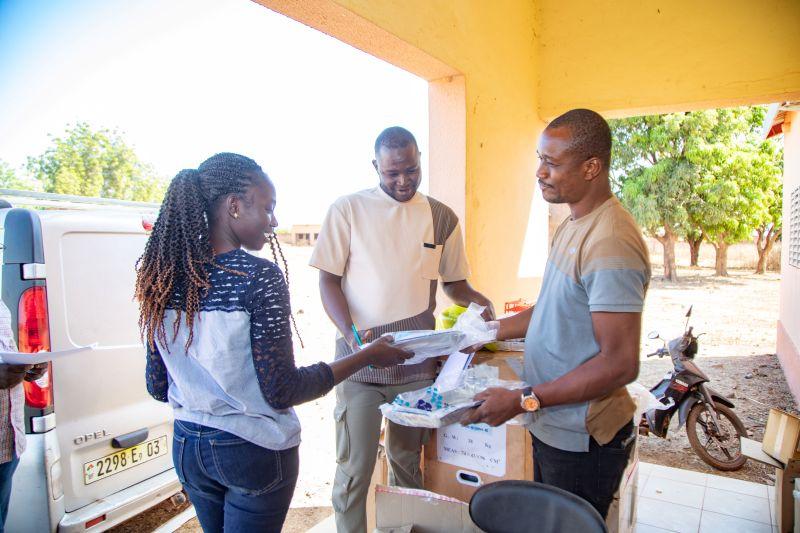
Burkina Faso : Enabel offre un équipement de pointe et de dernière génération aux laboratoires des Centres Médicaux de Tchériba et de Fara
Geoffroy ZONGO | 19/02/2026
Au Burkina Faso, dans l’ex-région de la Boucle du Mouhoun, l’accès à des services de santé de qualité franchit une nouvelle étape. Les Centres Médicaux (CM) de Tchériba et Fara disposent désormais de laboratoires entièrement fonctionnels, grâce à une dotation importante en équipements biomédicaux dans le cadre du Projet Lasso Santé, financé par l’Union européenne et mis en œuvre par Enabel, l’Agence belge de coopération internationale. Cette initiative répond directement aux besoins exprimés par les autorités sanitaires locales et reflète leur volonté d’améliorer l’accès à des diagnostics fiables et rapides pour les populations. La remise du matériel, d’un montant total de 52 711 438 FCFA HTVA, comprend un ensemble complet d’équipements permettant de réaliser sur place des examens essentiels : microscope binoculaire, automate d’hématologie, semi-automate de biochimie, centrifugeuse, matériel de prélèvement, réfrigération, pipettes, verrerie et consommables divers. Ces dispositifs, conformes aux normes nationales, viennent combler un important déficit qui limitait jusque-là les capacités diagnostiques des deux structures. Seydou Paré, Chargé de projet à Enabel, rappelle que l’installation d’un laboratoire fonctionnel est indispensable au fonctionnement d’un Centre Médical, et que Tchériba et Fara présentaient un besoin urgent en la matière. Il souligne que cette dotation répond directement aux sollicitations des équipes des districts sanitaires, soucieuses de renforcer l’offre de soins locale. Pour Stéphane Sanou, Responsable du CM de Tchériba, l’arrivée du matériel marque un tournant décisif : les patients pourront désormais bénéficier d’examens jusqu’alors indisponibles, comme la goutte épaisse, indispensable pour le diagnostic du paludisme. Ces avancées permettront non seulement d'améliorer la qualité du suivi médical, notamment pour les maladies chroniques comme le diabète, mais aussi de réduire sensiblement les déplacements des patients vers d’autres localités.Quant à Béatrice Tassembedo, Technologiste Biomédical, elle exprime sa satisfaction et son impatience de pouvoir travailler avec un équipement moderne, apte à offrir des résultats précis et rapides, améliorant ainsi la prise en charge globale des populations. Avec ces nouveaux équipements des laboratoires, Tchériba et Fara deviennent des pôles renforcés de diagnostic, capables d’offrir aux communautés locales une prise en charge plus complète, plus rapide et plus sûre. Une avancée majeure pour la santé publique dans l’ex-région de la Boucle du Mouhoun, rendue possible grâce au partenariat entre l’Union européenne et Enabel.
-
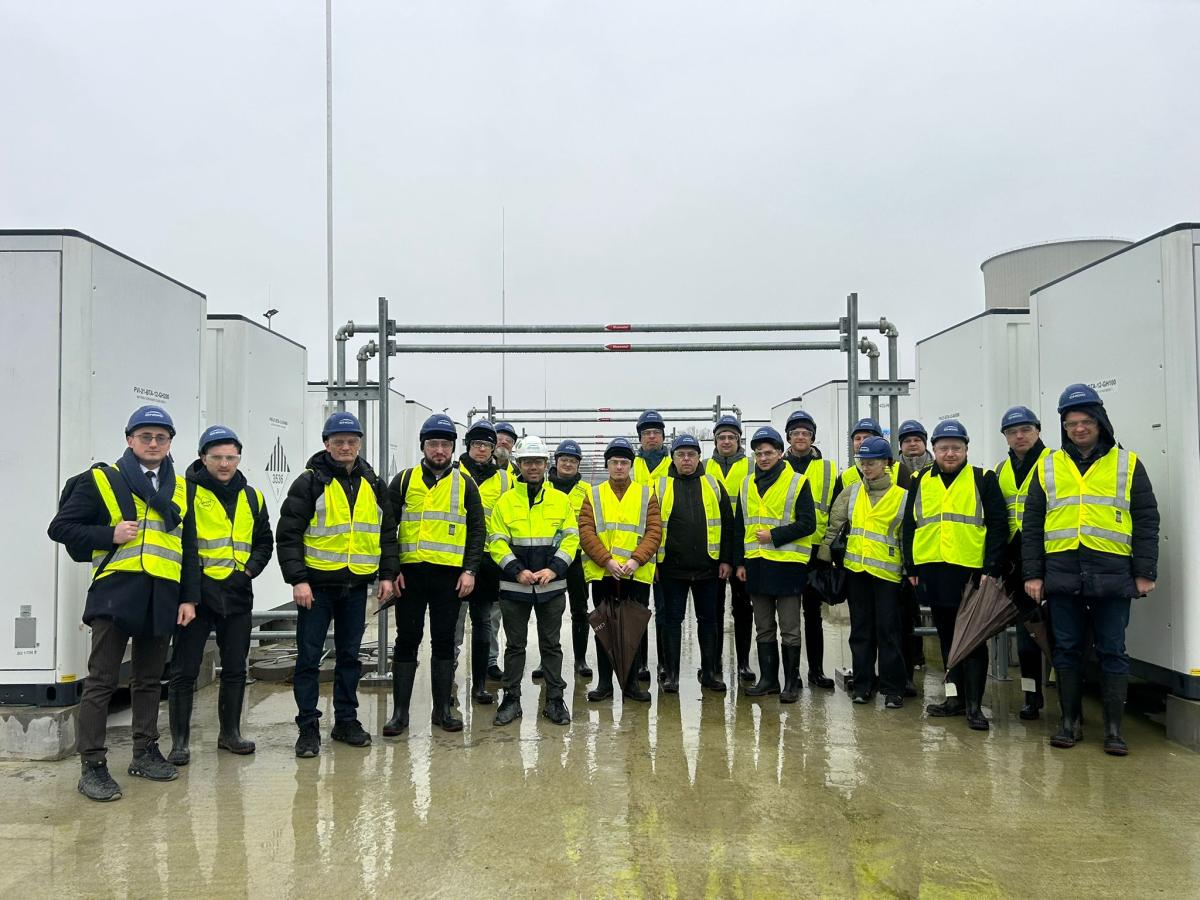
Energy study visit to Belgium: insights from Ukrainian experts
Taisiia DRUZIUK | 18/02/2026
Enabel welcomed senior public-sector energy delegations from Moldova, Ukraine and Palestine to Belgium for an intensive study tour from 2 to 6 February 2026.The programme combined site visits and targeted exchanges with leading Belgian public and private actors to explore energy efficiency in buildings, ESCO mechanisms, EU grid integration, battery energy storage systems (BESS) and battery circularity.The week featured engagements with a wide range of Belgian stakeholders across the energy ecosystem, including Elia, Brussels Environment, Engie, Umicore, Sortbat, Sibelga, Deplasse, Vlaams Energiebedrijf (VEB), Homegrade, Yuso, Ampacimon, Octave and Coopeos.These interactions enabled peer-to-peer learning on policy, regulation and operations, as well as hands-on exposure to Belgian innovations and project execution models.At Enabel's request, the participants from Ukraine's Ministry of Energy and Ministry of Development shared what stood out to them and which practices from their Belgian colleagues they felt were worth taking back home.● Liubava Radiychuk, Deputy Director (Municipal Infrastructure), Recovery and Reform Support Team at the Ministry for Development of Communities and Territories in UkraineGiving batteries a second life“The visit to Bebat and Sortbat offered a full picture of battery waste management – from collection and logistics to advanced sorting. Their strong focus on research, safety in storage and transport, and the use of AI and X-ray technologies for sorting were especially noteworthy.For Ukraine, where widespread battery use has become a necessity due to power outages, developing a comprehensive management strategy – including second-life applications – is now an urgent task.”Lessons from Belgium “From my perspective, the most relevant example for Ukraine is the integrated climate policy approach of Bruxelles Environnement, which demonstrates effective cooperation between public authorities and the private sector.In the near term, Ukraine should prioritise collecting and structuring reliable data – particularly on the condition of its building stock – to support evidence-based decisions.Over time, scaling up energy efficiency will require financial incentives, grant programs, circular economy standards, and consistent long-term planning.”● Roman Polishchuk, State Expert of the Expert Group on Renewable Energy Development, Ministry of Energy of UkraineInsights from the grid control room“Our visit to the control center of Belgium’s transmission system operator, Elia Group, left the strongest impression. Alongside the tour, we received a clear and practical overview of how their system is designed to manage balancing and integrate renewable energy.It was particularly insightful to watch, in real time, how a power system with a high share of renewables maintains stability – using market-based tools, ancillary services, and cross-border electricity flows.A powerful moment came when we saw Ukraine’s unified power system marked in red on the map, reflecting its forced isolated operation after the largest attack on energy infrastructure at that time. It was a stark reminder of how critical grid resilience and deeper integration with the European energy system are for Ukraine.Circularity as a strategy“One solution that stood out was presented by Ampacimon. The company develops transmission line sensors that monitor vibration, temperature, sag, and other indicators to determine real-time line capacity, with updates every five minutes.For Ukraine, where infrastructure damage has led to persistent transmission bottlenecks, such tools could help dispatchers at Ukrenergo make better use of available grid capacity and operate the system more flexibly.In the short term, battery energy storage systems (BESS) – especially when paired with solar power plants – are a priority. They would make it possible to shift generation from peak production hours to peak demand periods, reduce imbalances, and strengthen system flexibility.Looking further ahead, I was impressed by the model presented by Bebat, Sortbat, and Umicore. Their integrated system for collecting, sorting, and recycling batteries returns valuable materials back into production.This approach is increasingly relevant for Ukraine, given the rapid growth in power banks, backup storage systems, and the expected expansion of BESS and electric mobility.Establishing a single, vertically integrated operator with a closed-loop cycle – from collection to recycling – could help Ukraine prepare for rising volumes of used batteries.”
-
Burundi : Renforcer la coordination nationale en santé mentale
Jean BIRONKWA | 16/02/2026
Le ministère de la Santé Publique (MSP), avec l'appui d'Enabel à travers le projet NTUSIGARINYUMA – Volet Santé , a organisé le 12 février 2026 une réunion nationale de coordination réunissant une trentaine de partenaires techniques et financiers, organisations nationales et internationales intervenant dans le domaine de la santé mentale au Burundi.Cette rencontre s'inscrit dans une dynamique de consolidation de la gouvernance sectorielle et visait à renforcer la complémentarité des interventions, prévenir la dispersion des efforts et promouvoir une meilleure harmonisation des approches dans un contexte de montée en puissance de l'intégration de la santé mentale dans les soins de santé primaires. Les échanges ont mis en évidence la nécessité d'améliorer la cartographie des interventions afin de limiter les duplications ; d'adopter un langage commun dans les activités de sensibilisation et de communication ; d'harmoniser les outils, méthodes et protocoles d'intervention afin de garantir la qualité et la cohérence des messages définis aux communautés et de renforcer les mécanismes de coordination technique sous le leadership du MSP. Les participants ont souligné que l'alignement stratégique constitue une condition essentielle pour optimiser les ressources disponibles et renforcer l'impact des actions menées sur le terrain. Accès aux médicaments psychotropes : un enjeu prioritaire La disponibilité et l'accessibilité des médicaments psychotropes ont constitué un point central des discussions. Les participants ont exprimé leurs préoccupations face aux ruptures d'approvisionnement et aux coûts supportés par les patients nécessitant un traitement prolongé. « La disponibilité et l'accessibilité de ces médicaments essentiels restent une priorité pour assurer une prise en charge continue et de qualité » a souligné le délégué du Ministre de la Santé. L'amélioration du circuit d'approvisionnement et le renforcement du cadre normatif apparaissent comme des leviers structurants pour consolider l'intégration de la santé mentale dans le système de santé. Des données probantes pour orienter les politiques. Les participants ont également abordé la validation prochaine des résultats de l'enquête nationale sur la santé mentale. Cette étude, première du genre au Burundi, fournira des données probantes essentielles pour orienter la planification stratégique, le plaidoyer et l'allocation des ressources dans les années à venir. Une mobilisation élargie pour la Journée mondiale de la santé mentale Les résultats de la célébration de la Journée mondiale de la Santé Mentale 2026 ont été évoqués. Ce moment a été l'occasion de rappeler la nécessité d'une mobilisation intense des partenaires lors de la prochaine célébration de la Journée mondiale de la santé mentale en 2026 afin d'amplifier la sensibilisation du public et d'assurer la visibilité des actions menées au niveau national. Un engagement collectif pour une santé mentale intégrée et durable Cette réunion marque une étape importante dans le renforcement du dialogue sectoriel et de la collaboration entre acteurs activant dans le domaine de la santé mentale. Elle réaffirme l'engagement du MSP, des partenaires et des organisations présentes en faveur d'une approche coordonnée, intégrée et durable de la santé mentale au Burundi.
-
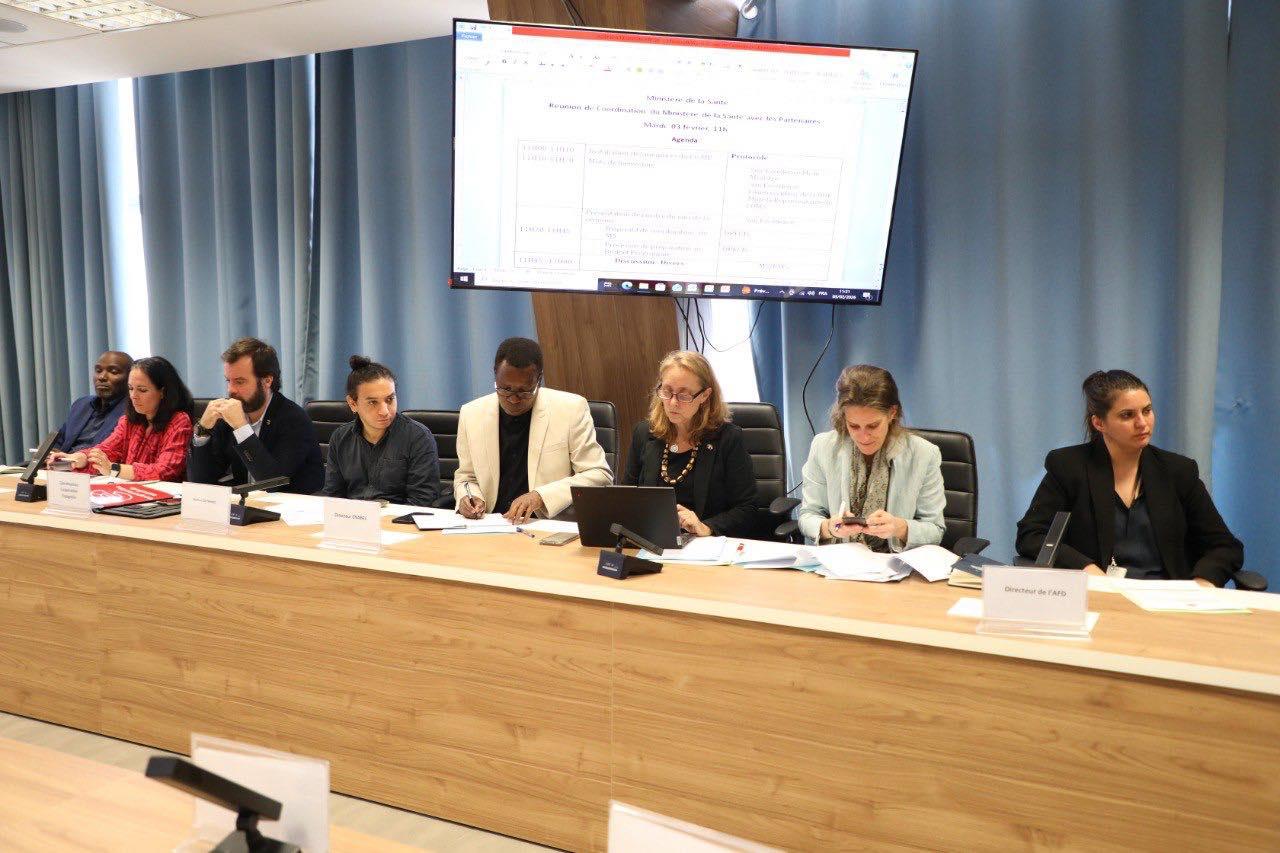
En Mauritanie: Renforcer la coordination pour un système de santé plus résilient et inclusif
Aminata KANE | 16/02/2026
Ce mardi 3 février, le Ministère de la Santé a tenu la première réunion annuelle 2026 avec les partenaires techniques et financiers du secteur, sous la présidence de Son Excellence le Ministre de la Santé, en présence du Chef de la Délégation de l’Union européenne en Mauritanie.Cette rencontre stratégique marque une étape clé dans l’alignement des appuis au secteur de la santé sur les priorités nationales, en cohérence avec le programme de Son Excellence le Président de la République et la feuille de route du Gouvernement.Dans ce cadre, le programme AIPASS3, financé par l’Union européenne et mis en œuvre par Enabel, s’inscrit pleinement dans cette dynamique de coordination renforcée et d’impact mesurable.AIPASS3 contribue notamment à :l’amélioration de la gouvernance du secteur de la santé,le renforcement de l’accès équitable à des services de santé de qualité,l’appui à la couverture santé et à la modernisation des systèmes, en lien avec les priorités nationales.En soutenant la plateforme nationale de coordination du financement et du suivi du Plan national de développement sanitaire, AIPASS3 participe à une meilleure harmonisation des interventions, à la transparence et à l’efficacité de l’action publique.L’Union européenne et Enabel réaffirment ainsi leur engagement aux côtés des autorités mauritaniennes pour bâtir un système de santé plus performant, plus résilient et centré sur les besoins des populations.
-
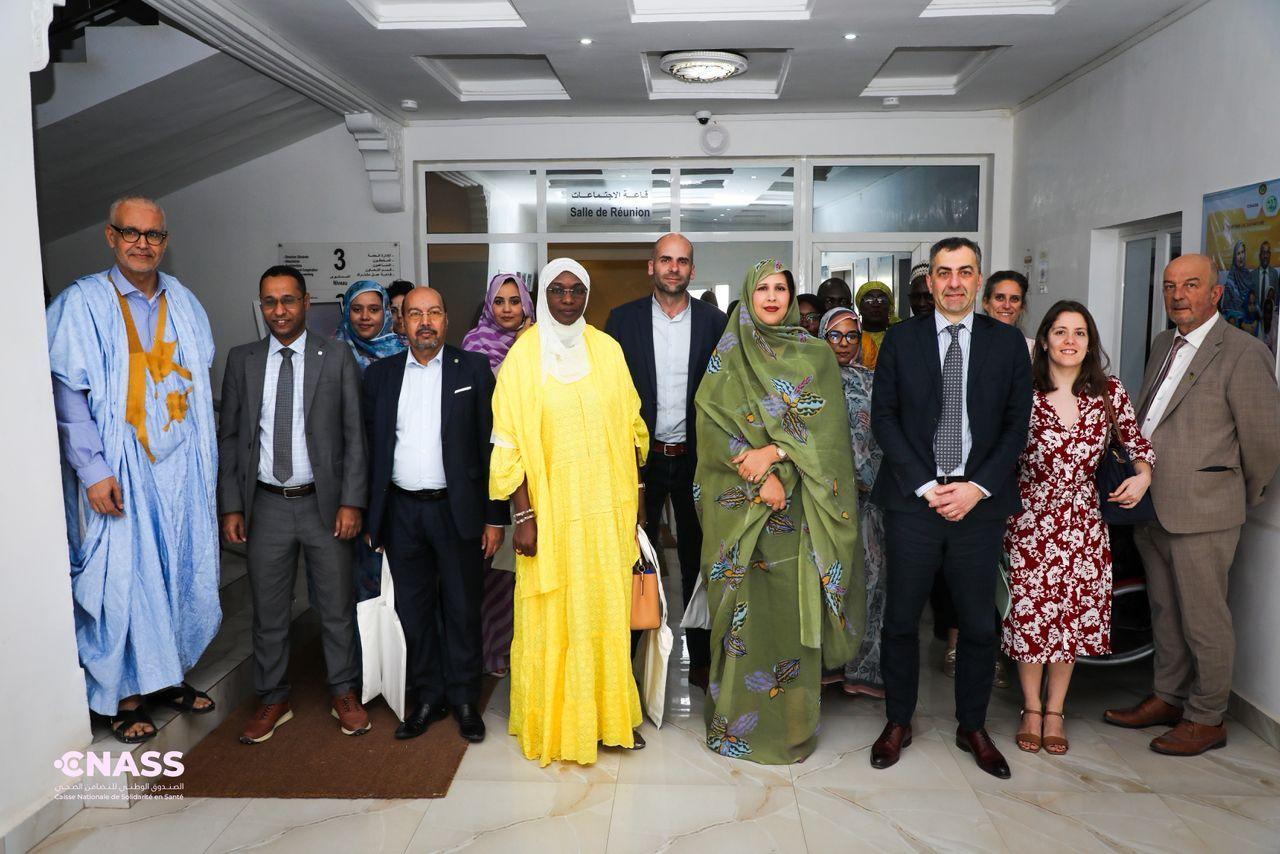
Partenariat stratégique pour la santé : AIPASS3 au cœur de l’appui technique au PASS depuis 2017
Aminata KANE | 16/02/2026
Dans le cadre du dialogue politique entre la République Islamique de Mauritanie et l’Union européenne, la Caisse Nationale de Solidarité en Santé (CNASS) a accueilli une mission conjointe du Service européen pour l’action extérieure(SEAE) et de la Direction générale des partenariats internationaux (INTPA). Cette visite s’inscrit dans une dynamique de consolidation du partenariat stratégique dans le secteur de la santé, en cohérence avec les priorités nationales.Les échanges ont permis de faire le point sur l’avancement du Programme d’Appui au Secteur de la Santé (PASS), financé par l’Union européenne depuis 2017 à hauteur d’environ 80 millions d’euros, avec un cofinancement de l’État mauritanien. Ce programme structurant accompagne les réformes majeures du système de santé, notamment en matière de gouvernance, d’accès aux soins et de couverture sanitaire universelle.La mission s’est tenue en présence de Monsieur Stefano Signore, Directeur Afrique à la DG INTPA, de Monsieur Wim Vandenbroucke, Chef de la Coopération de l’Union européenne en Mauritanie, ainsi que des représentants des autorités nationales. Laurent Delouvroy, Directeur pays d’Enabel, a pris part aux échanges, aux côtés de Elhadji Malick Ndiaye, Expert en Économie de la Santé, et de Maria Amparo Fernandez del Rio, Experte en Santé Digitale. Leur participation a permis de mettre en lumière les avancées techniques réalisées dans les domaines du financement de la santé et de la digitalisation des services.La mission a également souligné les progrès de la CNASS, notamment à travers les plateformes CNASSI et MIADI, ainsi que les perspectives liées au programme DIGISANTÉ et au développement du dossier patient électronique. Ces initiatives traduisent une volonté commune d’améliorer la qualité des services, la transparence et l’accessibilité pour les bénéficiaires.Inscrite dans le cadre de l’initiative européenne Global Gateway, cette mission confirme la solidité du partenariat entre la Mauritanie et l’Union européenne, avec l’appui technique stratégique d’Enabel, au service d’un système de santé plus inclusif, performant et durable.
-
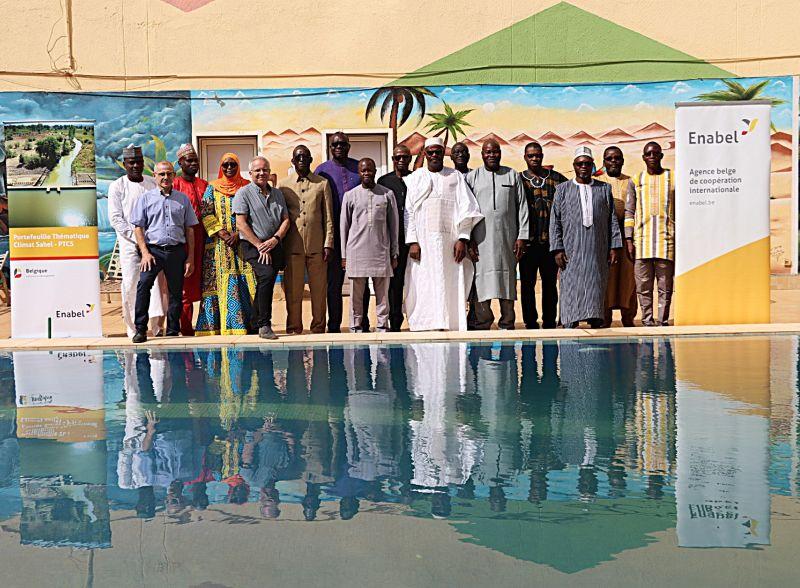
Quatre pays sahéliens unis pour renforcer la résilience climatique : Première session du Comité d’Orientation et de Concertation Régional du PTCS
Geoffroy ZONGO | 16/02/2026
Ouagadougou, 3–4 février 2026.Les représentants des pays partenaires (Burkina Faso, Mali, Niger et Sénégal) et d’Organisations régionales telles que l’Agence Panafricaine de la Grande muraille Verte (APGMV), AGRHYMET et le Réseau des Organisations Paysannes et de Producteurs de l’Afrique de l’Ouest (ROPPA) se sont réunis pour une session ordinaire du Comité d’Orientation et de Concertation Régional (COC/R) du Portefeuille Thématique Climat Sahel (PTCS). Le PTCS est un programme régional financé par le Royaume de Belgique et mis en œuvre par l’Agence belge de coopération internationale (Enabel). Cette rencontre stratégique marque une étape clé dans la gouvernance du portefeuille et dans la coordination des actions régionales en faveur de la lutte contre la désertification et les effets néfastes du changement climatique. Un cadre régional enfin opérationnelAprès plus de trois années de mise en œuvre du PTCS, la tenue de cette première session du COC/R était fortement attendue. L’instance réunit 18 membres issus des agences nationales de la Grande Muraille Verte (ANGMV) et des ministères sectoriels des pays partenaires, des organisations régionales (CILSS/AGRHYMET, APGMV, ROPPA) ainsi que les cinq chefs de projets PTCS Enabel. Coprésidée par le Programme Manager de Enabel en charge du PTCS et le représentant de l’APGMV, elle a pour mission de renforcer le pilotage stratégique du PTCS, d’assurer la cohérence des interventions à l’échelle régionale, de proposer des actions transversales et de définir une stratégie de sortie durable. Pour le Dr Oblé NEYA Coordonnateur régional du PTCS, cette première rencontre constitue une « grande réussite au regard de la forte mobilisation des membres avec 16 présents sur 18 attendus et de la qualité des contributions ». Deux jours d’échanges intenses sur les acquis, défis et perspectivesLe premier jour, marqué par le début des travaux a connu la validation du Règlement d’Ordre Intérieur du COC/R, étape essentielle pour structurer le fonctionnement du comité. Les participants ont ensuite passé en revue : l’état d’avancement global du PTCS ; les acquis majeurs, notamment 26 140 hectares restaurés, 458 536 bénéficiaires du programme, des progrès significatifs dans la gestion durable des terres, l’agroécologie, la gouvernance foncière et l’accès à l’eau ; les défis rencontrés dans un contexte sahélien marqué par l’insécurité, les déplacements de populations et la réduction de financements externes.La deuxième journée a permis de : (i) formuler des recommandations pour la capitalisation et la pérennisation des acquis ; (ii) identifier les actions prioritaires pour 2026 et une sortie réussie du programme ; (iii) identifier des actions pour renforcer la synergie entre pays et organisations régionales ; (iv) valider la feuille de route régionale du programme pour la période 2026–2027. Des appréciations positives et un engagement renouvelé des acteursLes participants ont unanimement salué : la pertinence du cadre régional, indispensable pour renforcer la complémentarité des actions entre les pays ; la qualité des résultats déjà obtenus dans les quatre volets nationaux ; et la vision stratégique du programme, alignée sur l’Initiative de la Grande Muraille Verte (IGMV).Des témoignages forts des représentants de pays et d’institutions :ROPPA (Ousséni Ouedraogo) : « Les résultats sont importants, variés, et démontrent que le PTCS est un levier pour mutualiser les approches, capitaliser les innovations et influencer les politiques publiques. » APGMV (Dr Sakhoudia Thiam) : « La session a permis de dégager des recommandations fortes pour renforcer les capacités, la collecte de données et l’implication des collectivités locales. » ANGMV-Mali (Toumany Diallo) : « Cette rencontre est logique et nécessaire pour harmoniser les actions après quatre ans d’exécution. Le PTCS fait partie des rares programmes encore actifs dans les pays de l’AES. » ANGMV-Niger (Tomo Nakaka Abdoulaye) : « L’atelier nous permet de poser les bases d’une stratégie de sortie garantissant la pérennité des acquis et une meilleure mise en synergie entre pays. » ANGMV-Sénégal (Commandant Djibril Thioye) : « L’une des forces du PTCS est son focus sur la capitalisation et la durabilité, trop souvent négligées dans les projets précédents. » Principales orientations et recommandationsLes travaux ont permis d’adopter plusieurs recommandations majeures pour renforcer la résilience climatique dans la région sahélienne : 1. Assurer une sortie réussie du PTCS (2027) : une appropriation des acquis par les États partenaires, une mise en place de dispositifs nationaux et locaux durables et une pérennisation des actions de restauration, agroécologie et hydrauliques. 2. Intensifier la capitalisation et la mise à l’échelle à travers : le partage systématique des expériences réussies entre le Burkina Faso, le Mali, le Niger et le Sénégal et le renforcement du rôle du ROPPA et du CILSS dans la diffusion des innovations. 3. Renforcer les capacités des acteurs en appuyant davantage les agences nationales de la Grande Muraille Verte, en formant et équipant les acteurs locaux pour un suivi ultérieur autonome des acquis des interventions. 4. Mobiliser de nouvelles ressources à travers des recherches de cofinancements et des financements innovants pour une phase 2 potentielle du PTCS et la consolidation des partenariats régionaux et continentaux.Un Sahel plus résilient grâce à l’action collectiveLe Portefeuille Thématique Climat Sahel confirme son rôle de levier régional majeur pour la restauration des écosystèmes, l’amélioration des moyens de subsistance et le renforcement de la résilience climatique des populations dans les quatre pays concernés. Cette première session du COC/R a non seulement validé le cadre de gouvernance du programme au niveau régional, mais aussi et surtout renouvelé la dynamique de collaboration entre les quatre pays sahéliens, les organisations régionales et Enabel dans un contexte où la solidarité régionale et la coopération internationale sont plus que jamais essentielles.
-
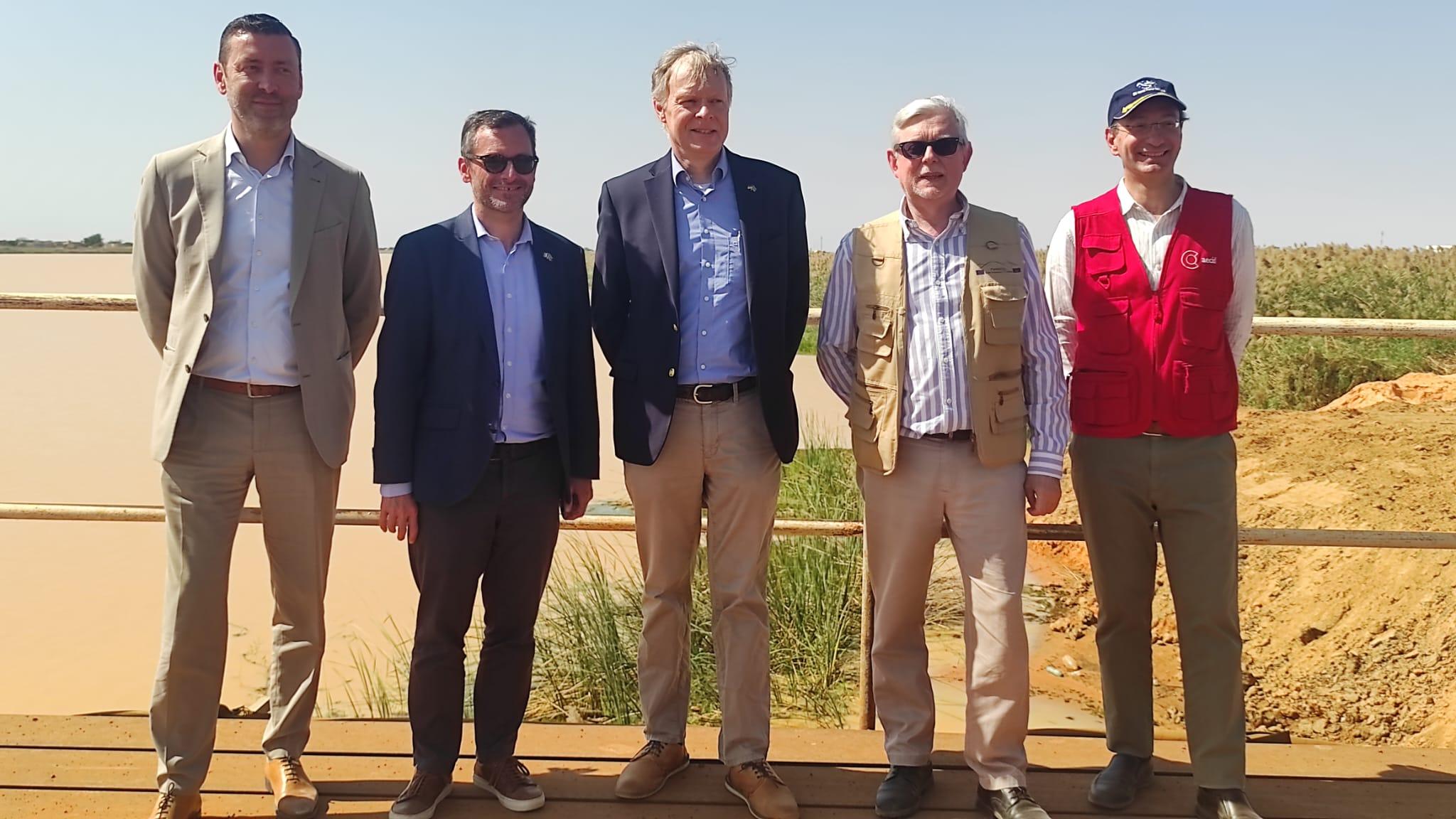
Mission conjointe Team Europe dans le sud de la Mauritanie : une vitrine de l’impact de la coopération européenne et belge
Aminata KANE | 15/02/2026
Portée par une initiative de l’Union européenne, cette mission conjointe d’ambassadeurs — S.E.M. l’Ambassadeur de la République fédérale d’Allemagne en Mauritanie Florian Reindel, S.E.M. l’Ambassadeur du Royaume d’Espagne Pablo Bárbara Gómez, S.E.M. l’Ambassadeur de France en Mauritanie Emmanuel Besnier, S.E.M. l’Ambassadeur de l’Union européenne en Mauritanie Joaquín Tasso Vilallonga, et M. Heikki Vandermander, Conseiller aux affaires politiques et économiques qui représente l’Ambassade du Royaume de Belgique — s’est inscrite dans la dynamique Team Europe visant à mieux coordonner les actions des États membres et des institutions européennes sur le terrain. En rassemblant plusieurs représentations diplomatiques autour d’un même itinéraire et de visites de projets phares, l’Union européenne a voulu envoyer un signal fort de partenariat avec les autorités mauritaniennes et de soutien aux populations des régions les plus vulnérables.Au total, 10 sites ont été visités dans quatre wilayas, illustrant la diversité et la complémentarité des interventions européennes :3 sites mis en œuvre par la coopération belge à travers Enabel,2 projets portés par la Agence Française de Développement,1 intervention de la AECID (Espagne),1 infrastructure de formation soutenue par la KfW (Allemagne),1 action relevant de l’instrument européen de stabilité mise en œuvre par la FIIAPP avec les unités GAR-SI Sahel,ainsi que des initiatives de résilience et de gouvernance locale financées par l’Union européenne et la visite du chantier du pont de Rosso, ouvrage structurant pour l’intégration sous-régionale.Une forte visibilité pour la coopération belge et l’action d’EnabelLa visite conjointe des ambassadeurs européens dans le sud de la Mauritanie a offert une vitrine majeure aux actions menées par Enabel en faveur de la sécurité alimentaire, de la résilience et de l’accès à la santé. Cette mission de l’Équipe Europe, qui a rassemblé plusieurs représentations diplomatiques, a permis de démontrer concrètement la contribution de la coopération belge aux priorités nationales mauritaniennes.Trois sites soutenus par Enabel ont constitué des temps forts du programme : Ajar Sarakolé – Jardins maraîchers circulairesCe site illustre une approche intégrée combinant maraîchage, élevage et cultures fourragères, appuyée par des systèmes d’irrigation performants et une production destinée à la fois à l’autoconsommation et aux marchés locaux. Il démontre comment l’appui d’Enabel renforce durablement la résilience économique et alimentaire des ménages ruraux. Yadjende – Périmètre fourragerLe développement des cultures fourragères, associé à la formation des producteurs et à la valorisation commerciale du fourrage, soutient l’embouche, améliore les revenus et renforce le rôle des femmes dans les filières agropastorales.Boghé – Centre de santé et antenne de la CNASSCette visite a mis en lumière l’engagement d’Enabel, aux côtés des autorités sanitaires, pour améliorer l’accès aux soins de santé primaires, renforcer la couverture santé et accompagner la mise en place d’un système de protection sociale plus équitable.Des résultats concrets au bénéfice des populationsCes visites ont permis aux ambassadeurs de constater des résultats tangibles :des infrastructures fonctionnelles,des organisations locales pleinement impliquées,des innovations techniques adaptées aux réalités territoriales,et surtout des bénéficiaires — femmes, jeunes et producteurs — placés au cœur des dispositifs.La complémentarité de l’approche Team EuropeLa mission a également mis en évidence la cohérence et la complémentarité des interventions européennes dans le sud du pays :agriculture et agropastoral, décentralisation, éducation, formation professionnelle, santé, sécurité et grands ouvrages structurants.Dans cet ensemble, Enabel apparaît comme un acteur clé de la mise en œuvre de l’agenda européen, capable de relier les investissements aux dynamiques locales et d’agir au plus près des communautés.Une dynamique porteuse pour la coopération belgePour la Belgique, cette visite :renforce la visibilité de sa coopération,confirme la pertinence des orientations stratégiques,témoigne d’un intérêt croissant pour la Mauritanie.Pour Enabel, elle ouvre de nouvelles perspectives de dialogue stratégique avec les ambassades et les institutions européennes afin de :consolider les synergies,amplifier l’impact des programmes,positionner la coopération belge comme un pilier central de l’Équipe Europe en Mauritanie.
-
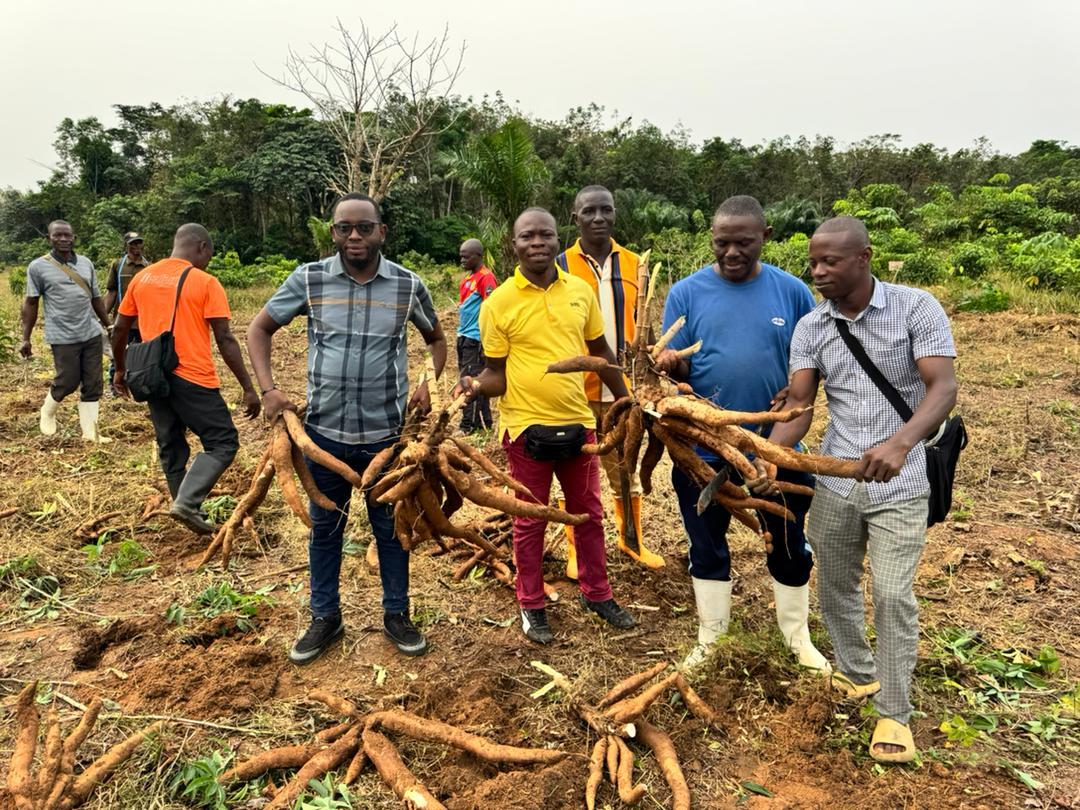
Des résultats prometteurs pour la culture du manioc à Gwaka
Paola VANGU TSAKALA | 13/02/2026
Des Champs Écoles Paysans pour apprendre en pratiquant À Gwaka, dans le territoire de Budjala, un groupe de formateurs locaux formés au sein des Champs Écoles Paysans (CEP) vient d'enregistrer une première récolte encourageante de manioc. Appuyés par le projet Agriculture et Sécurité Alimentaire mis en œuvre par Enabel, les CEP reposent sur une approche d'apprentissage participatif fondée sur la pratique, l'observation et l'expérimentation directe au champ. Durant les deux cultures de 2025, les moniteurs agricoles se sont concentrés sur l'étude du manioc, aliment de base largement consommé dans la région mais fortement affecté par la mosaïque, une maladie virale responsable d'importantes pertes de rendement. Un dispositif expérimental a été mis en place afin de comparer trois variétés : Wilimowande (variété locale), ainsi qu'Obama et Ilona , deux variétés améliorées. L'objectif était d'identifier la variété la plus résistante et la plus productive dans les conditions agroclimatiques locales. La variété Ilona se démarque Les résultats se sont révélés particulièrement encourageants. La variété Ilona a démontré une forte tolérance à la mosaïque et une performance productive remarquable, avec plus d'une demi-tonne réalisée sur 160 m² — soit l'équivalent de plus de 30 tonnes à l'hectare en neuf mois. À titre comparatif, la variété locale Wilimowande n'a un produit qu'environ 300 kg sur la même surface. « Ilona nous a impressionnés par la densité de son feuillage, même en saison sèche. Dès neuf mois, ses racines tubéreuses mûrissent. Sa capacité à occuper l'espace réduit également les besoins en sarclage », explique Jean-Pierre Lipesu, l'un des agriculteurs impliqués dans l'apprentissage. Un effet multiplicateur au service des producteurs À la suite de cette expérimentation réussie, une vingtaine de moniteurs agricoles formés au CEP de Gwaka ont entamé la transmission de ces nouvelles connaissances à plus de 4 600 producteurs de manioc, dont une majorité de femmes, dans les territoires de Budjala et Gemena. Cette dynamique vise à améliorer durablement la production locale, à renforcer la résilience face aux maladies des cultures et à soutenir l'augmentation des revenus agricoles dans le Sud-Ubangui.
-
Uganda Tourism Association charts tourism future with Strategic Plan, developed in collaboration with Enabel
Jovia KAVULU | 13/02/2026
The Uganda Tourism Association (UTA) has officially launched its Strategic Plan 2026–2030, a landmark step toward strengthening Uganda’s tourism private sector and positioning it for sustainable, inclusive growth. Developed in close collaboration with Enabel, the Strategic Plan sets out a bold roadmap for the next five years. It prioritises institutional strengthening, sustainable financing, improved service delivery, enhanced communication, and the promotion of professionalism, standards, and responsible tourism practices. For Enabel, this launch is the natural progression of years of investment in Uganda’s tourism sector. From strengthening associations and governance systems to promoting training for youth and women, Enabel has consistently worked to build a resilient industry that balances competitiveness with sustainability and inclusion. Enabel has championed Fair Trade Tourism certification, inclusive business models, and occupational safety campaigns in hospitality workplaces. These efforts have contributed to positioning Uganda as a regional leader in responsible tourism. “Tourism today is not only about numbers, but about quality experiences, sustainability, and strong collaboration,” said Nicolas Oebel, Enabel Country Director. “This Strategic Plan reflects that shift, ensuring that Uganda’s tourism growth translates into competitiveness, decent jobs, and tangible benefits for communities.” UTA President Yewagnesh (Yogi) Biriggwa noted that the Strategic Plan provides a clear framework for the private sector to speak with one voice: “This Plan strengthens our ability to represent the industry, coordinate effectively, and ensure that tourism growth benefits not only enterprises but also communities across Uganda.” The Plan also reinforces UTA’s role as the apex body representing Uganda’s tourism private sector. Over the next five years, UTA will strengthen its institutional capacity and expand its membership base, bringing more community-based enterprises under one unified voice to improve coordination and advocacy across the industry. The launch comes at a pivotal moment, following the unveiling of the Uganda Tourism Policy and coinciding with renewed European Union investments worth €20 million, including projects implemented with Enabel and UNESCO to market and brand Uganda globally. In addition, Enabel recently signed a new project with the European Union that will further position Uganda as an attractive tourist destination while empowering communities in and around tourism sites. This initiative will ensure that local people benefit directly from tourism growth through skills development, enterprise opportunities, and inclusive business models. H.E. Jan Sadek, European Union Ambassador to Uganda, welcomed the launch, noting: “Our objective is to support tourism growth that is inclusive and sustainable — marketing and branding Uganda as an attractive destination while ensuring that communities around tourism sites benefit.” The government reaffirmed their commitment to working closely with the private sector, citing ongoing infrastructure investments in destinations such as Bwindi and Kidepo as critical enablers for competitiveness. Enabel continues to strengthen institutions, enhance competitiveness, and promotes green and decent jobs for youth. The UTA Strategic Plan 2026–2030 aligns seamlessly with this vision, offering a structured pathway toward a more professional, resilient, and coordinated tourism ecosystem. As implementation begins, the shared ambition is clear: to build a tourism industry that delivers quality experiences, drives sustainable economic growth, and creates meaningful opportunities for Ugandans across regions.
-
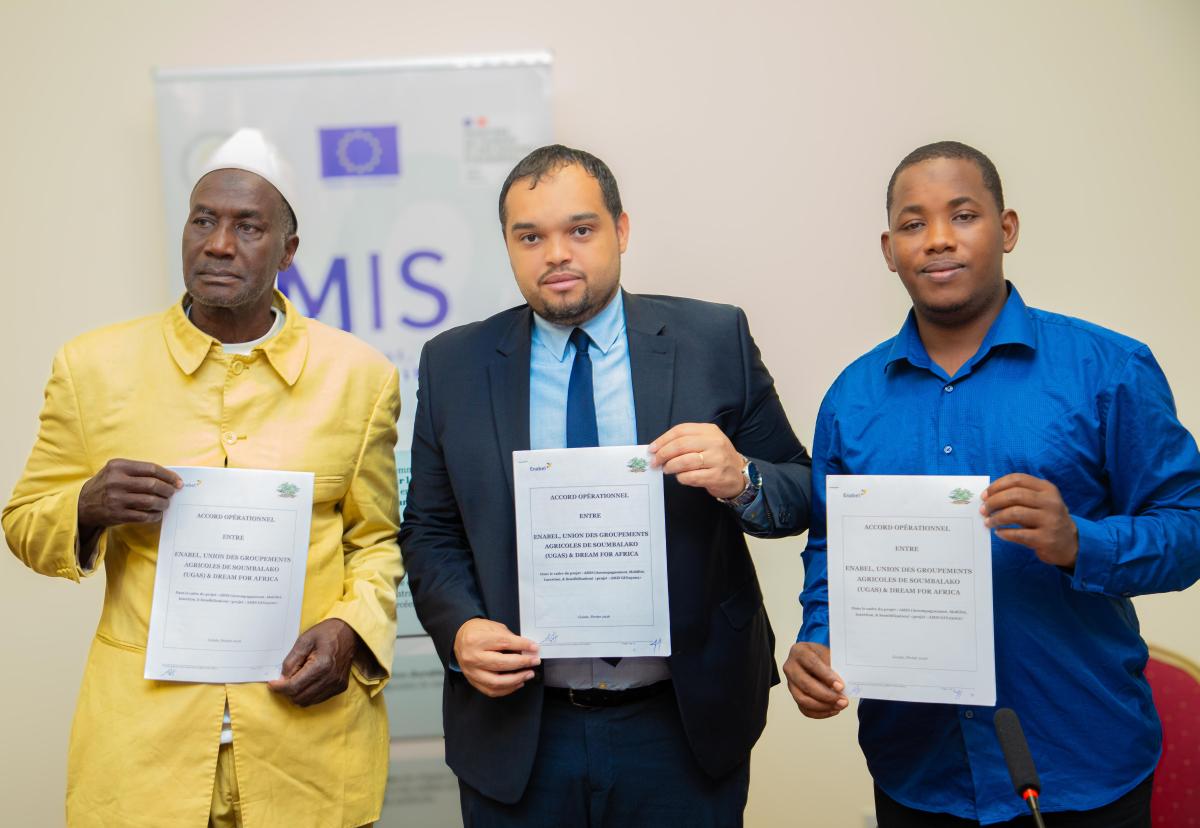
Projet AMIS : Signature des accords opérationnels entre faitières, incubateurs et Enabel
Jacques LENO | 12/02/2026
Enabel Guinée a procédé, le mardi 11 février 2026 à Conakry, à la signature des accords opérationnels avec les faitières des organisations paysannes et les incubateurs des régions de Conakry, Kindia et Mamou. Une étape essentielle dans la mise en œuvre du projet AMIS (Accompagnement, Mobilité, Insertion & Sensibilisation) et dans l’atteinte du Produit 3, qui vise l’amélioration de la (ré)intégration durable des jeunes, des femmes, des personnes vulnérables et des migrants de retour en Guinée. Ces accords concernent spécifiquement, le parcours auto-emploi qui vise à former des jeunes, femmes et personnes migrantes de retour à disposer de leurs propres activités génératrices de revenus. Objectif : permettre aux faitières et aux incubateurs de travailler en synergie pour offrir un accompagnement complet aux jeunes en quête d’autonomisation. Secteurs porteurs concernés : Riziculture Aviculture Apiculture Maraîchage (Kindia & Mamou) Digital (Conakry) Les faitières faciliteront l’accès à la terre et renforceront les capacités des jeunes en pratiques agricoles. Les incubateurs, quant à eux, accompagneront les jeunes inscrits dans les parcours d’autoemploi pour structurer leurs activités génératrices de revenus et améliorer la gestion financière.
-
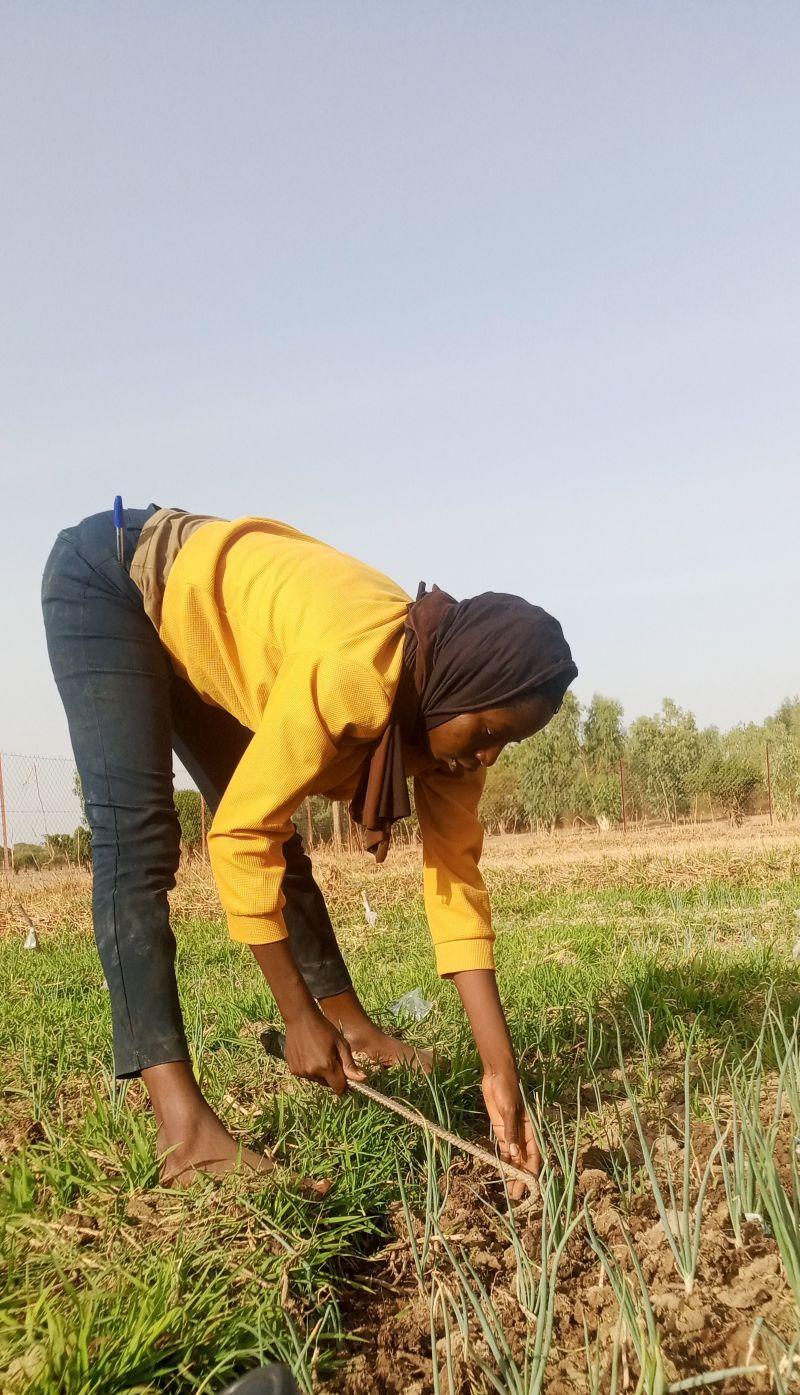
Climat & Agroécologie au Burkina Faso : la nouvelle génération de chercheurs s’engage !
Geoffroy ZONGO | 09/02/2026
La région du Sahel est particulièrement vulnérable aux changements climatiques. C’est une région où les questions de changement climatique, de dégradation des écosystèmes et de conflit sont étroitement interconnectées et se traduisent par des impacts environnementaux majeurs. Pour renforcer la résilience des populations sahéliennes vulnérables, Enabel, à travers son Portefeuille Thématique Climat Sahel (PTCS) accompagne les communautés locales en améliorant la disponibilité et l’accessibilité aux bonnes pratiques et aux innovations relatives à la résilience au changement climatique et à la restauration des terres. Dans ce cadre, le Portefeuille Thématique Climat Sahel (PTCS) a prévu mobiliser des acteurs du monde scientifique et de la recherche pour contribuer à l’identification et à la diffusion de solutions adaptées et pérennes en matière de gestion durable des écosystèmes sahéliens. C’est ainsi le volet régional et le volet Burkina Faso du PTCS a accompagné la mise en place de trois plateformes d’innovation en matière de la résilience climatique et de la gestion durable des écosystèmes sahéliens dans les communes de Koupéla, Meguet et Boulsa respectivement dans les régions du Nakambé, de Oubri et de Koulsé. Trois centres d’innovation agroécologiques ont été aménagés au profit de ces trois plateformes d’innovation. Dans le cadre de ce projet, six (06) bourses d’études dont trois en Thèse de Doctorat et trois en Master ont été octroyé à des étudiants burkinabé par Enabel. Leurs travaux de recherche sont en cours et contribueront à améliorer les résultats de la recherche dans les domaines de l’agroécologie et du changement climatique et contribuer à l’atteintes des objectifs du portefeuille.Ces étudiants ont conduit leurs recherches dans les centres d’innovation agroécologiques des trois plateformes d’innovation. L’état et les résultats de leurs travaux se présentent dans les lignes qui suivent. Minata SANOU, Doctorante à l’Université Joseph KI-ZERBO mène ses travaux de recherche sur la « contribution de la Faidherbia Albida dans la gestion des sols sous culture agroforestier ».L’objectif général de sa recherche est de contribuer à la résilience aux changements climatiques et à la gestion durable des écosystèmes dans la commune de Koupéla, région du Centre-Est du Burkina Faso.L’étude consiste à faire des enquêtes ethnobotaniques complémentaires sur Faidherbia albida et mettre en place un essai expérimental pour son intégration dans les systèmes de production. Il été également question de prélever des sols des sols (échantillons composites de sol) sous et hors houppier de Parkia biglobosa (Néré), de Vitellaria paradoxa (Karité) et du Faidherbia albida à l’horizon 0-10 et 10-20 cm pour apprécier l’apport en éléments nutritifs de ces espèces agroforestières. Les horizons 0-10 cm ont été analysés grâce au soutien d’Enabel.Les paramètres de croissance dont la hauteur des plants du collet au bourgeon terminal ; le diamètre au collet ; le nombre de feuilles/rameau et le nombre des rameaux/pied ont été mesurés. A ce jour, l’étude montre environ 60 % de taux de réussite de semis et plantation de Faidherbia albida soit 72 pieds/ha.L’étudiante Minata poursuit ses travaux de recherche qui aboutiront à une soutenance de thèse et à des publications scientifiques.OUEDRAOGO Abasse, Doctorant à l’Université Joseph KI-ZERBO mène ses travaux de recherche sur « Evaluation d’extrait aqueux de Calétropis procréa face aux agresseurs d’ordre fongiques du soja au Burkina Faso ». Il conduit sa recherche dans un conte de limitation de la production de soja par les maladies fongiques et son cette étude propose une alternative durable aux fongicides de synthèse : l’utilisation d’extraits aqueux de Calotropis procera et Lippia multiflora, plantes locales accessibles et biodégradables.Son objectif général est d’améliorer la productivité du soja via des traitements naturels. Et de façon spécifique il fait l’inventaire des champignons pathogènes dans la zone de Koupèla. RÉSULTATS CLÉS OBTENUS • Collecte et isolement : 12 souches isolées à partir des semences et 19 à partir des plantes malades. • Prédominance fongique : Aspergillus spp. domine avec 55,39 % des isolats, suivi de Curvularia (9,83 %) et Fusarium (4,91 %). • Enquête de terrain : Sur 100 producteurs interrogés, Lippia multiflora est déjà utilisée traditionnellement pour la conservation des semences, tandis que Calotropis procera reste méconnue et sous-exploitée. • Collecte des plantes : Réalisée à 80 % en période de floraison pour maximiser les composés bioactifs. L’étudiant Abasse poursuit ses travaux de recherche qui aboutiront à une soutenance de thèse et à des publications scientifiques.Vanessa Tégawandé BORO/KABORE, Doctorante à l’Institut International d'Ingénierie de l'Eau et de l'Environnement (2iE), a mené ses travaux de recherche sur « la solution d'imperméabilisation accessible et durable de bassin des collectes des eaux de ruissellement en zone soudano sahélienne ». Elle a conduit sa recherche dans un contexte auquel la gestion durable de l’eau en zone soudano-sahélienne constitue un enjeu stratégique dans un contexte de sécheresses récurrentes, de forte variabilité pluviométrique et de dégradation accélérée des terres agricoles. Les bassins de collecte des eaux de ruissellement (BCER) représentent donc une solution clé pour l’irrigation d’appoint, mais leur efficacité est fortement limitée par les pertes par infiltration. Sa recherche a évalué les performances techniques, économiques et environnementales de cinq matériaux de revêtement (bitume, kaolinite, vertisol, géomembrane PEHD et perré maçonné), à travers (i) une enquête participative auprès de 41 producteurs (méthode WASO-2) et (ii) une expérimentation in situ conduite sur les saisons pluvieuses 2024–2025.Les résultats indiquent que le bitume réduit les infiltrations de 85 %, mais induit une contamination de l’eau par les hydrocarbures totaux, atteignant 2,4 mg/L, incluant des hydrocarbures aromatiques polycycliques (HAP) à potentiel cancérogène. Cette contrainte limite son usage aux contextes non alimentaires. La kaolinite permet une réduction des infiltrations de 82 % avec un excellent rapport coût-efficacité. Le vertisol, bien que performant en fin de saison par gonflement argileux, demeure limité par une forte turbidité et une faible durabilité. La géomembrane PEHD de 80 µm s’est révélée structurellement fragile, tandis que le perré maçonné, bien que robuste, présentait une perméabilité initiale excessive.Une réhabilitation technique, basée sur l’utilisation d’une géomembrane PEHD de 750 µm et d’un perré renforcé par un mortier hydrofuge (350 kg/m³, 10 % Sikalite), a permis une amélioration durable des performances. Le suivi de la qualité de l’eau, fondé sur 11 paramètres physico-chimiques, montre que la géomembrane stabilise les caractéristiques chimiques, mais induit une augmentation des chlorures (+60,23 %) et du pH (+48,40 %). Les revêtements argileux améliorent l’acidité et certains ions (réduction du SAR jusqu’à −74,23 %, augmentation du Ca²⁺), mais génèrent une turbidité incompatible avec l’irrigation localisée.Ces résultats confirment que le choix des revêtements de BCER doit intégrer simultanément les critères d’étanchéité, de coût, de durabilité et de qualité de l’eau, en tenant compte du risque de contamination par hydrocarbures. La géomembrane épaisse (750 microns) et le perré maçonné renforcé apparaissent comme les solutions les plus fiables à long terme pour les conditions agro climatiques soudano-sahéliennes.Vanessa a soutenu sa thèse de doctorat avec brio couronné d’une mention « Honorable ».Vous pourrez consulter ses publications scientifiques par le lien ci-dessus : https://www.mdpi.com/2079-9276/13/10/144 Hamadé BONKOUNGOU, étudiant en Master 2 à l’Université NAZI-BONI /IDR mène ses recherche sur « le renforcement de la productivité du maïs en contre saison a Roumtenga : évaluation variétale et réponse a la fertilisation ».L’objectif de cette recherche est de renforcer la productivité du maïs cultivé en identifiant les variétés et fertilisations adaptées. Plus spécifiquement, l’étude vise à comparer les performances agronomiques de plusieurs variétés de maïs à double usage et à analyser l’effet de la fertilisation chimique, organique et mixte sur le rendement en grain et en biomasse.Les résultats atteints sont entre autres : o Le dispositif expérimental a été mis en place avec succès en contre saison, incluant huit variétés de maïs et quatre types de fertilisation dans un dispositif en split-plot avec répétitions. o Les semis ont montré un bon taux de levée, indiquant une bonne qualité des semences et une bonne adaptation des variétés aux conditions de contre saison. o Les premières observations agronomiques ont permis de collecter des données fiables sur la croissance des plantes, le développement végétatif et la production de biomasse. o Les résultats préliminaires montrent des différences entre variétés et entre modes de fertilisation, suggérant une interaction importante entre le matériel végétal et la gestion de la fertilité des sols. o L’analyse des données montre que des variations ont été observées sur le poids des épis, le poids de mille grains et la production de fourrage.o Actuellement nous sommes dans les corrections pour le dépôt du mémoire Hamadé poursuit ses recherches en préparant sa soutenance. Les résultats de ses travaux contribueront à améliorer les pratiques agricoles au niveau paysans.Aurelie Flavy Rufine ZONGO, étudiante en Master 2 à l’Université Nazi BONI (UNB) mène ses recherche sur « Effet de cinq biofertilisants sur le rendement d’oignon et sur le sol».Ses recherches ont pour but de faire face à la dégradation des sols en utilisant des solutions agroécologiques qui vulgarisent des systèmes et mode de fertilisations respectueuse de l’environnement. Il s’agit d’évaluer l’effet de cinq biofertilisants sur le rendement d’oignon et sur le sol. L’étude vise à promouvoir les pratiques agroécologiques et formuler des recommandations pertinentes pour une agriculture plus efficace. Plus spécifiquement, il s’est agi de comparer l’effet de ces différents biofertilisants sur le rendement de l’oignon et de comparer leurs effets sur la fertilité des sols. L’étude a été mener à Roumtenga, dans la ferme agroécologique ABNA. Le dispositif utilisé était le Bloc Complètement Randomiser (BCR), avec six (06) traitements et quatre (04) répétitions : T0 (Témoin), T1 (bokashi), T2 (compost aérobie), T3 (fumier recyclé), T4 (supermagro), T5 (lifofer). La parcelle d’expérimentation comportait au total 24 micro-parcelles de 3m2. Au début et à la fin de l’étude des prélèvements de sol ont été effectués suivant les diagonales, pour analyse au laboratoire afin de voir l’effet des biofertilisants sur la fertilité des sols. Avant la mise en place de l’essai, une enquête a été faite pour déterminer les cinq biofertilisants utilisés lors de cette étude. Les données agronomiques collectées étaient la hauteur des pieds, le diamètre au collet, le nombre de feuille, le poids des bulbes après récolte.Cette étude a révélé que pour les biofertilisants solides (compost, bokashi, fumier recyclé), le compost a donné les meilleurs rendements avec 2,56 kg/ha contre 2,46 kg/ha pour le bokashi et 1,72 kg/ha pour le fumier recyclé et 0,68 pour le témoin. En ce qui concerne les fertilisants liquides (supermagro, lifofer), le plus grand rendement a été obtenu avec le supermagro avec 1,62 kg/ha contre 0,93 pour le lifofer et 0,68 pour le témoin. On constate alors, que les biofertilisants liquides ont donné de meilleur rendement par rapport aux biofertilisants solides. L’étude a été mené a dans des conditions pas trop propices à la culture de l’oignon et le sol était très argileux ceux qui a beaucoup influencé les résultats obtenus. Ils ouvrent ainsi donc les perspectives d’approfondir l’étude en tenant compte des variations saisonnières, des types de sol et des variétés d’oignon.Aurélie prépare sa soutenance et ses travaux contribueront à améliorer les pratiques agricoles au niveau paysans. Boubacar Sontonnooma SINARE, étudiant en Master 2 à l’Université Nazi BONI (UNB), mène ses recherches sur « les Effets de différentes formulations de compost enrichi sur les paramètres de croissances du niébé [Vigna unguiculata (L.) Walp.] et les paramètres physico-chimiques du sol dans le village de Roumtenga, Burkina Faso ». Boubacar conduit ses recherches dans un contexte où l’agriculture maraîchère est essentielle pour l’alimentation et l’économie rurales au Burkina Faso, mais la dégradation des sols menace fortement la productivité agricole. Face à cette situation, les techniques de gestion durable, notamment l’utilisation de compost enrichi en microorganismes efficaces produit localement (EM), constituent une alternative prometteuse pour restaurer la fertilité des sols. Son étude vise ainsi à contribuer à la gestion durable des sols dans les périmètres maraîchers. Plus spécifiquement, il s’est agi de produire du compost enrichi aux microorganismes efficaces en utilisant des matériaux locaux et d’en évaluer son effet ainsi que d’autres types de fertilisants sur la fertilité des sols en condition de culture. Le dispositif expérimental mise en place à cet effet est un bloc complètement randomisé avec 5 traitements et 4 répétitions. Ce sont : Traitement témoin (T0) ; Compost aérobie simple (T1) ; Compost enrichi au Trichoderma (T2) ; Compost enrichi aux microorganismes efficaces locaux (T3) et le Bokachi (T4). Les paramètres tels que le diamètre et la hauteur des plants, les biomasses aériennes et racinaires, la nodulation du niébé ont été mesurés. Les teneurs en éléments fertilisants ont été déterminées en début et à la fin de l’expérimentation. Les résultats ont montré que les traitements au compost enrichi aux microorganismes efficaces produit localement (T3) et ceux du compost enrichi au Trichoderma (T2) ont donné les meilleures croissances et les biomasses aériennes les plus importantes. La nodulation du niébé a été influencée significativement par l’utilisation du compost enrichi aux microorganismes efficaces produit localement. L’analyse chimique des sols a indiqué une augmentation de la teneur en matière organique qui est passée de 1,38 % à 1,75 % et de celle en N, P et K du sol. Ces résultats confirment le rôle déterminant des composts enrichis dans la restauration et le maintien de la fertilité des sols agricoles et soulignent leur potentiel comme alternative durable aux fertilisants chimiques pour améliorer la productivité des sols au Burkina Faso.Boubacar prepare sa soutenance et ses travaux contribueront à améliorer les pratiques agricoles au niveau paysans.
-
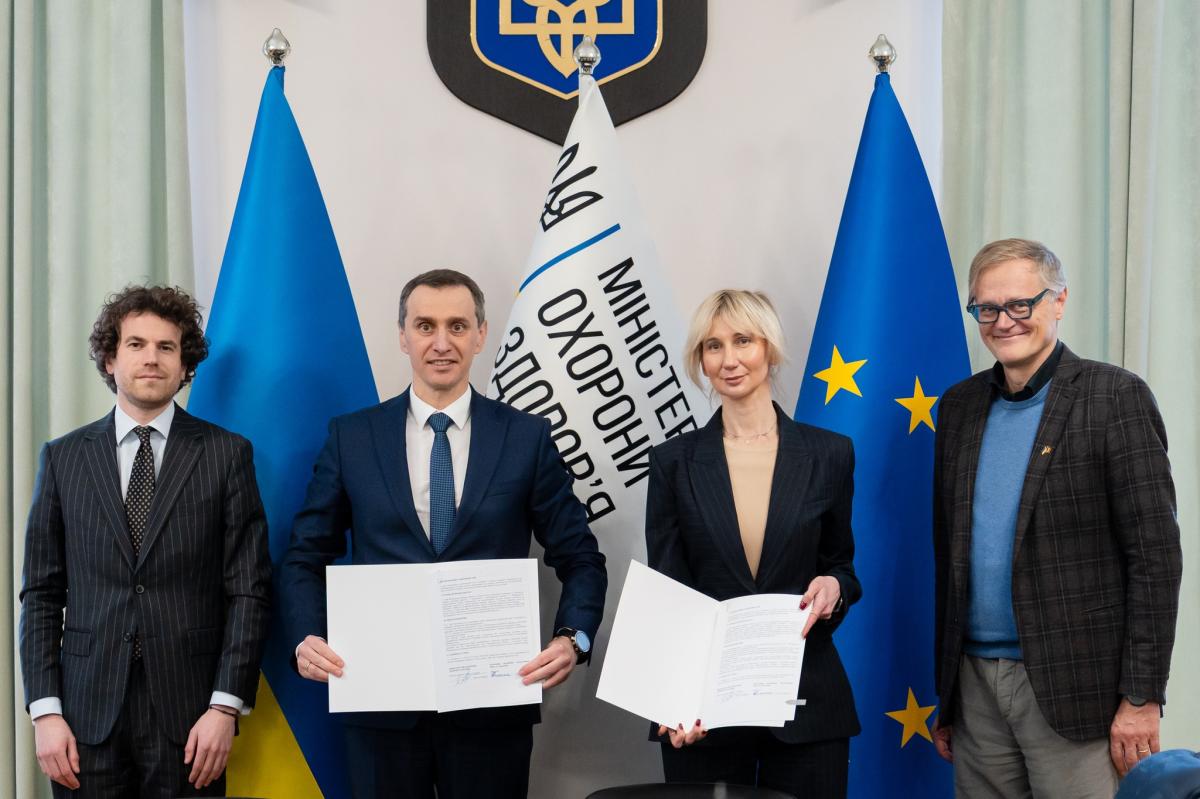
Enabel partners with Ukraine's Ministry of Health and Superhumans to strengthen maxillofacial surgery system
Taisiia DRUZIUK | 09/02/2026
Superhumans, the War Trauma Center, and the Ministry of Health of Ukraine have signed a Memorandum of Understanding to cooperate in the field of maxillofacial surgery as part of a joint project with Enabel.This memorandum represents a systematic response to the complex maxillofacial injuries that Ukrainian healthcare has been addressing under the conditions of a full-scale war. Within the Belgian-funded project, Superhumans will become one of Ukraine’s centers of excellence in maxillofacial surgery. It will integrate the treatment of the most complex cases, professional training for surgeons, and long-term patient follow-up and rehabilitation.The project includes:Establishing centers of excellence in Lviv and KyivLaunching training and simulation hubs for specialist educationDefining patient pathways and implementing a case management systemWorking toward sustainable public funding for complex reconstructive proceduresThe project is planned for 2025–2028 and is being implemented in partnership with the Ministry of Health of Ukraine, Enabel, and leading medical and educational institutions, including:– Danylo Halytsky Lviv National Medical University (Department of Surgical Dentistry and Maxillofacial Surgery)– O. O. Bohomolets National Medical University (Department of Maxillofacial Surgery and Advanced Dental Technologies)– Kyiv Regional Clinical Hospital– Doctors for Heroes NGO
